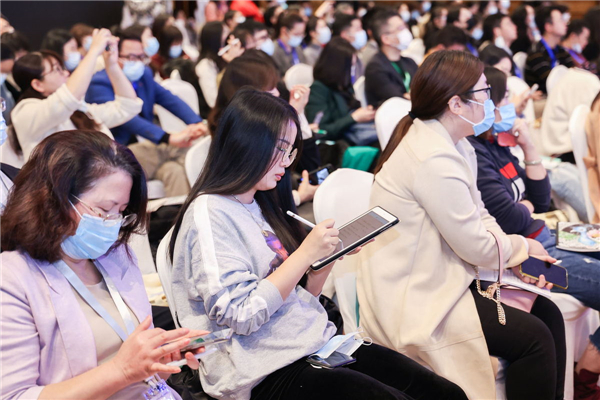Teachers urged to learn from BRI peers

Participants take notes during the 2020 Global English Education China Assembly in Hangzhou, Zhejiang province, on Friday. Language educators should continue to promote the opening up of the education sector and strengthen international cooperation and communication, experts said at the assembly, which had the theme "cooperation and learning for a shared future". Provided to China Daily
English-language teachers in China and countries and regions participating in the Belt and Road Initiative should enhance cooperation and communication and learn from each other's experiences, experts and educators said at the 2020 Global English Education China Assembly.
The three-day assembly, held from Friday to Sunday online and offline in Beijing and Hangzhou, Zhejiang province, gave participants valuable opportunities to share experiences in dealing with common challenges in English-language teaching during the COVID-19 pandemic and effective new teaching methods they can use in the post-pandemic era, they said.
Zhao Ronghui, professor at Shanghai International Studies University, said languages have an irreplaceable role in promoting communication, understanding and cooperation among people around the world, and English is the most widely used lingua franca.
Many countries and regions participating in the Belt and Road Initiative have attached great importance to English education, so it is very important for China to conduct in-depth cooperation with those countries and regions, she said.
The cooperation will improve the quality of English education in China and BRI countries and regions, accelerate the development of the initiative and promote the construction of a community with a shared future for mankind, she said.
Supong Tangkiengsirisin, associate professor at the language institute of Thammasat University in Thailand, said online learning technology, now widely used by teachers due to the COVID-19 pandemic, can help bridge gaps and make the distance between countries shorter.
Through online platforms, Thailand can invite scholars from China to teach English, share their ideas in English and communicate in English or in Chinese with Thai students. In addition, Thai teachers can conduct workshops, lectures and discussions with Chinese students in China, he said.
Motikala Subba Dewan, associate professor at Tribhuvan University in Nepal, said alliances and partnerships between China and Nepal can be found at educational institutions in Nepal, including Confucius Institutes at universities and Confucius Classrooms in schools.
Such partnerships highlight the value of cultural awareness and provide comprehensible input to develop culturally appropriate materials for students, enhancing English-language instruction in both countries, she said.
Lockdowns brought about by the COVID-19 pandemic have made online instruction a supplementary skill to face-to-face teaching, she said, and teachers have learned the importance of picking up digital skills.
"There is a high chance of continuing post-COVID virtual teaching and learning practices in the academic institutions in Nepal," she said.
Denise Quah Seok Hoon, senior lecturer at the Institute of Teacher Education Malaysia's Tuanku Bainun Campus in Penang, Malaysia, said disruptions due to the pandemic had left Malaysian teachers facing some of the same challenges as their Chinese counterparts.
"Online learning and teaching may have its advantages, but teachers have to face the fact that not all our learners have equal access to a stable internet connection, and some also face problems when there aren't enough devices for all the children to be attending online classes," she said.
Teachers need to remember that in this time of crisis, they need to teach with empathy-to put themselves in the learners' shoes, try to see through their eyes, talk to their students and find out what works best for them. If teachers are willing to do this, she said, they will discover what method works best for their students.




